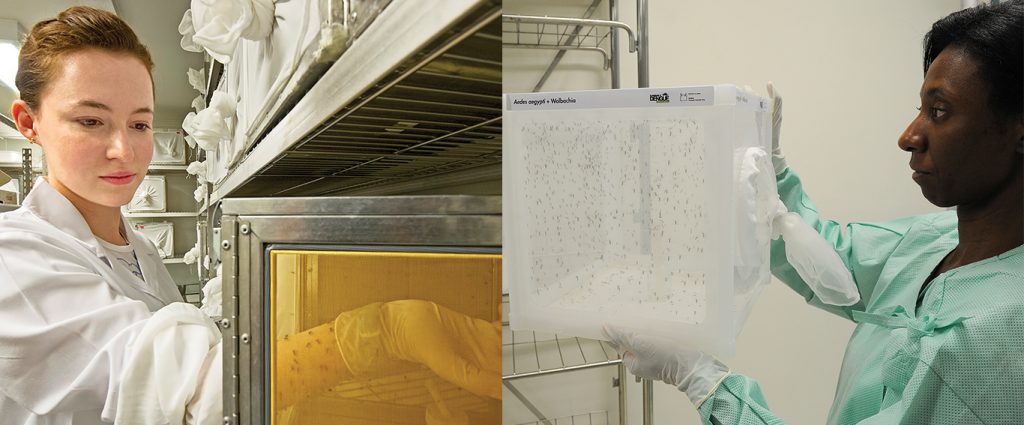
Photos (left to right): Eliminate Dengue Global Lead Professor Scott O’Neill with Eliminate Dengue Brazil Lead Dr Luciano Moreira. Credit: Eliminate Dengue Brazil/Fiocruz;
Aedes aegypti mosquitoes carrying Wolbachia are reared in the Fiocruz laboratory in Rio de Janeiro, Brazil. Credit: Peter Illiciev/Fiocruz
Building Dialogue, Consensus and Solutions for Health Threats Around the World
In the early 21st century, the 10/90 Gap was at the forefront of conversation within the global health community. The Global Forum on Health Research asserted that just 10 percent of medical research was devoted to the diseases that cause 90 percent of the world’s health burden. To fill this gap, there was a critical need to increase research on diseases that cause millions of deaths in the developing world.
The FNIH joined the effort to reduce the 10/90 Gap in 2003 as a founding member of a program that advanced global disease research on a colossal scale. With an investment of $200 million from the Bill & Melinda Gates Foundation, the FNIH formed its largest partnership called the Grand Challenges in Global Health Initiative (Grand Challenges). The goal of the initiative was to encourage application of the latest scientific innovations to combat the most intractable health problems of the world’s poorest countries. Under Grand Challenges, the FNIH managed 20 projects in 25 countries focused on improving existing and developing new vaccines; creating strategies to control the transmission of diseases; developing pharmaceuticals and delivery systems that minimize likelihood of resistance; and generating methods to cure chronic infections.
By 2016, the FNIH’s continued partnership with the Bill & Melinda Gates Foundation that furthered the work of Grand Challenges had advanced two highly novel technologies for preventing the spread of mosquito-borne diseases to field testing, and stimulated consensus building around the development pathway for new mosquito modification technologies. Eliminate Dengue was one project the FNIH initiated under Grand Challenges. Scott O’Neill, Ph.D., then at University of Queensland and later at Monash University, Australia, received a $6.7 million grant for research in 2005. Soon after, he had a breakthrough moment upon discovery that the common Wolbachia bacterium could block the replication of the dengue virus within Aedes aegypti mosquitoes, which are responsible for transmitting the disease. By 2008, he had produced mosquitoes that could consistently pass Wolbachia to their offspring and block virus replication, therefore interrupting transmission of the dengue virus to humans. Eliminate Dengue was ready for small scale outdoor release of the mosquitoes in Australia by 2011, Vietnam by 2013 and Indonesia by 2014 in collaboration with local governments.
By 2016, the Zika virus became a priority health concern worldwide and Eliminate Dengue researchers had another breakthrough. They confirmed that Wolbachia obstructs the spread of the Zika virus by mosquitoes. Since then, the World Health Organization called on Eliminate Dengue to proceed with pilot deployment of the technology and project teams are scaling-up activities in Antioquia, Colombia and Rio de Janeiro, Brazil.
Another Grand Challenges grant supported by the FNIH was awarded in 2005 to a project now called Target Malaria. The project uses genetic modification technology (gene drive) to reduce mosquitoes’ ability to transmit parasites that cause diseases such as malaria. The advancement of this technology is at the forefront of global discussions as the emergence of systems like CRISPR/Cas9 are making gene drive constructs easier to build.
The $8.7 million grant was awarded to Austin Burt, Ph.D., Imperial College London, UK, and his team to support ways to protect people from malaria-carrying mosquitoes. Over the next decade and with additional funding through the FNIH, Prof. Burt demonstrated that gene drives could be used to reduce the reproduction of malaria mosquitoes. By 2011, the project established field sites in Africa, now collaborating with scientists in Burkina Faso, Mali and Uganda. Today, Target Malaria continues to refine its gene drive strategy with the goal of contributing to the global eradication of malaria.
In ongoing partnership with the Bill & Melinda Gates Foundation, part of the FNIH’s role has been to ensure that the scientific community explored the complex regulatory and ethical issues surrounding mosquito modification technology. The FNIH helped fund a National Academies of Sciences, Engineering, and Medicine study that supported further testing of gene drive approaches, while recommending a collaborative and cautionary approach to the research and governance of these technologies. Additionally, the FNIH hosted the “Problem Formulation for Use of Gene Drive Technology in Mosquitoes” workshop in 2016. It brought together a diverse group of international experts to conduct a systematic evaluation of potential risks associated with the use of gene drive technology to reduce the burden of malaria in Africa and to consider the potential for unintended consequences. This workshop developed consensus that will help to inform the design of further research, guidelines and regulations.
Grand Challenges propelled the FNIH onto the world stage, spurring its rapid growth. Through the initiative, the FNIH expanded its infrastructure by bringing globally-recognized scientists to the team and establishing its capacity for grant making. Due largely to Grand Challenges, the FNIH has become internationally recognized for its initiatives focused on opening dialogue, developing consensus and implementing solutions for health threats that affect people around the globe.